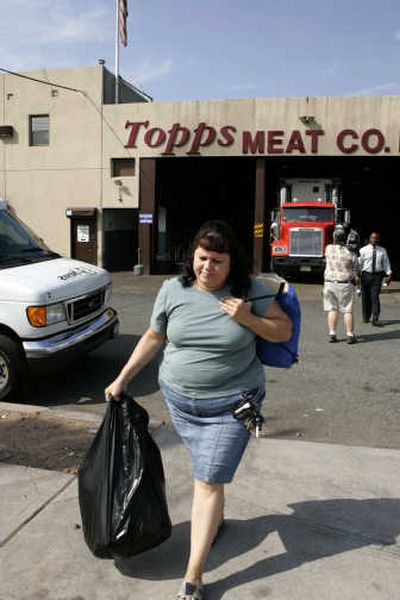Topps Meat Co. closing

NEWARK, N.J. – Topps Meat Co. on Friday said it was closing its business, six days after it was forced to issue the second-largest beef recall in U.S. history and 67 years after it opened its doors. The decision will cost 87 people their jobs, Topps said.
On Sept. 25, Topps began recalling frozen hamburger patties that may have been contaminated with the potentially fatal E. coli bacteria strain O157:H7. The recall eventually ballooned to 21.7 million pounds of ground beef.
Thirty people in eight states had E. coli infections matching the strain found in the Topps patties, the Centers for Disease Control and Prevention reported. None has died.
“This is tragic for all concerned,” said Topps Chief Operating Officer Anthony D’Urso, a member of the family that founded the company in 1940.
The Topps recall raised questions about whether the U.S. Agriculture Department should have acted quicker to encourage a recall. On Thursday, top USDA officials said they would speed warnings in the future.
Topps conceded that much of the recalled meat had already been eaten, and on Friday expressed regret that its product had been linked to illnesses. “We hope and pray for the full recovery of those individuals,” D’Urso said in a statement.
Topps, which halted production Sept. 26, is not the first meat company shuttered by a recall. Hudson Foods Co. closed its plant in Columbus, Neb., after it agreed in 1997 to destroy 25 million pounds of hamburger in the largest U.S. meat recall after E. coli was found in the ground beef. The plant later reopened with new owners.
Topps faces at least two lawsuits filed since the recall, one from the family of an upstate New York girl who became ill, and one seeking class-action status on behalf of all people who bought or ate the hamburgers. The family of a Florida girl who suffered kidney failure sued Wal-Mart Stores Inc., which is among chains that sold Topps patties.
The closing, or any subsequent bankruptcy, does not derail the lawsuits, said William D. Marler, a lawyer for the family of 8-year-old Emily McDonald, of North Colonie, N.Y. She was hospitalized for two days after eating a hamburger Aug. 17 at a barbecue.
“Bankruptcy will slow the process down, but it does not mean that people will not be compensated,” Marler said.
The Elizabeth-based company had initially recalled 331,582 pounds of its frozen hamburgers on Sept. 25, acting only after the New York State Department of Health issued an alert linking its patties to illnesses.
Topps on Sept. 29 recalled 21.7 million pounds of its frozen hamburgers – a year’s worth of production – after further evidence from the New York State Department of Health indicated a wider problem.
The bacteria, which can be fatal to humans, is harbored in the intestines of cattle and can also get on their hides. Improper butchering and processing can cause the E. coli to get onto meat.
Thorough cooking, to at least 160 degrees internal temperature, can destroy the bacteria.
Privately held Topps, which claimed to be the leading U.S. maker of frozen hamburger patties, said it sells its products to supermarkets and institutions such as schools, hospitals, restaurants and hotels.
The CDC reported the number of linked cases in these states: Connecticut, 2; Florida, 1; Indiana, 1; Maine, 1; New Jersey, 7; New York, 9; Ohio, 1; and Pennsylvania, 8.
The recall represents all Topps hamburger products with either a “sell by date” or a “best if used by date” between Sept. 25, 2007 and Sept. 25, 2008. All recalled products also have the USDA establishment number EST 9748, which is on the back panel of the package or in the USDA legend. A full list of the recalled products is available at www.toppsmeat.com.